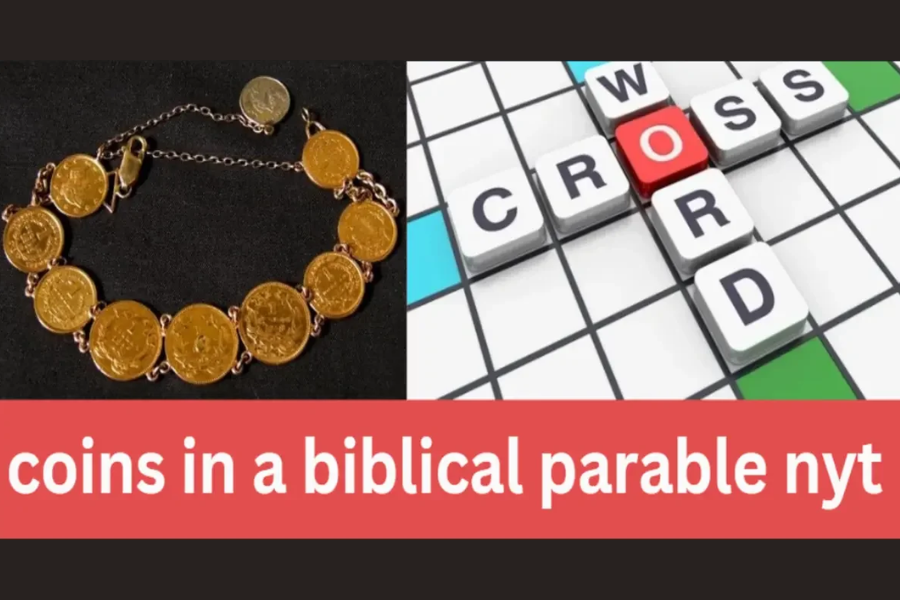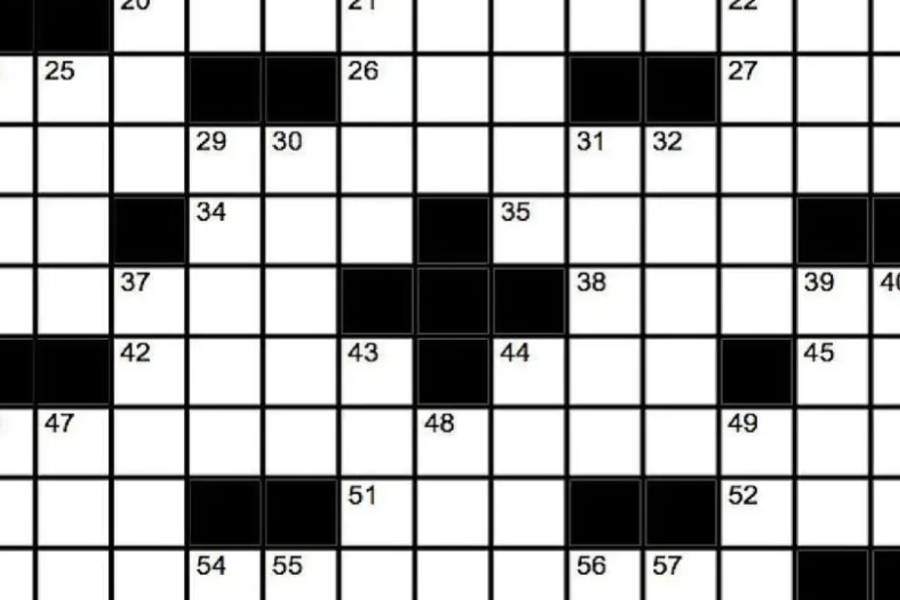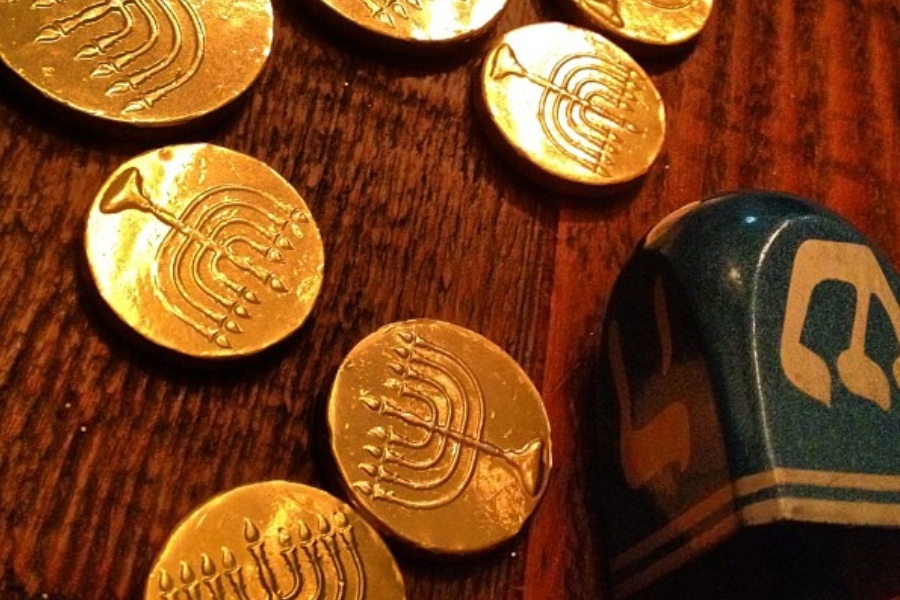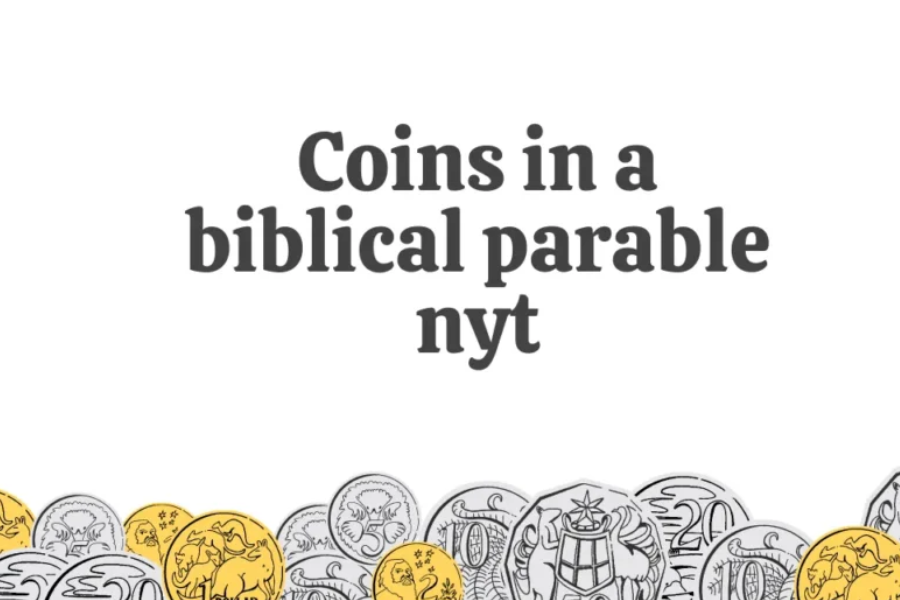Coins In A Biblical Parable nyt: Understanding Their Role In Moral Teachings
If you’ve been grappling with the crossword clue coins in a biblical parable NYT, which was last featured on June 8, 2024, you’re in luck! Crossword puzzles can be a fun and engaging way to stimulate your mind, especially as you age. They provide a workout for your brain, enhancing cognitive function and potentially lowering the risk of cognitive decline. Whether you’re a seasoned crossword enthusiast or a casual player, each clue is an opportunity to challenge yourself and learn something new.
For the specific clue mentioned, the answer is often “mites.” This term refers to the small coins mentioned in the parable of the widow’s mite from the New Testament. In this story, a poor widow donates two mites to the temple, highlighting the value of her contribution despite its small size. The parable emphasizes that it’s not the amount of money given that matters, but the spirit and sacrifice behind the offering. Thus, the clue not only adds depth to your crossword but also brings to light a meaningful lesson from biblical teachings, connecting faith with the everyday act of giving.
The Parable Of The Talents: A Lesson In Growth And Responsibility

The Parable of the Talents, located in the Gospel of Matthew, narrates the tale of a master who gives different quantities of coins, referred to as “talents,” to three of his servants before departing on a journey. Two of the servants invest and multiply their talents, while the third, out of fear, hides his coin in the ground. Upon his return, the master praises the two who used their resources to create growth, rewarding them for their initiative and effort. In contrast, he reprimands the third servant for failing to make use of the potential given to him. This story illustrates the values of courage, resourcefulness, and accountability in managing what one is entrusted with.
In this parable, the coins represent more than material wealth; they symbolize personal gifts, skills, and opportunities. The master’s response underscores the responsibility to make productive use of one’s talents, encouraging active engagement with one’s abilities for both personal advancement and community contribution. This narrative serves as a powerful reminder that true growth comes not from conserving resources out of fear but from taking measured risks and investing in one’s potential, ultimately benefiting both oneself and society.
“Coins In A Biblical Parable NYT”: A Link Between Past Lessons and Modern Puzzles
The clue “coins in a biblical parable” frequently appears in the New York Times crossword, often leading solvers to the answer “talents.” This reference to the Parable of the Talents bridges ancient teachings of stewardship with a contemporary puzzle-solving experience. By presenting such a biblical theme in the crossword, the NYT offers solvers a unique way to engage with moral lessons on resourcefulness, accountability, and the responsible use of one’s gifts. It serves as a reminder that the teachings of stewardship and growth are still relevant in modern life, encouraging readers to consider how these principles can apply to their daily choices.
Incorporating themes from biblical narratives into crosswords also enriches the solving experience by blending historical and cultural contexts. Solvers are invited to reflect on the significance of using their resources wisely and the broader impact of personal actions on their communities. By challenging individuals with this timeless story, the crossword encourages a reflection on ethical growth and shared responsibility. This thoughtful interplay of ancient wisdom and contemporary entertainment brings a cultural depth to the puzzle, fostering a sense of connectedness to universal values across time.
The Educational And Cultural Significance Of Crosswords
Crosswords, especially those featured in the New York Times, offer more than just a mental challenge; they enhance vocabulary, stimulate cultural awareness, and encourage an exploration of historical narratives. Clues such as “coins in a biblical parable nyt” introduce solvers to classic stories like the Parable of the Talents, blending entertainment with learning. This blend of intellectual engagement with cultural references helps solvers connect with a shared heritage, making the crossword a space for revisiting and reflecting on historical and literary knowledge within a modern framework.
Beyond intellectual exercise, these puzzles foster a bridge between ancient wisdom and contemporary life, creating a unique sense of continuity. By engaging with these clues, crossword enthusiasts are reminded of the lasting impact of narratives that have shaped cultural values and ethical perspectives. Such puzzles encourage individuals to reflect on lessons from the past in a way that’s relevant to the present, deepening a sense of cultural connection and reinforcing the timeless nature of certain themes, like stewardship and personal growth, that continue to resonate across generations.
Engagement Through Crossword Puzzles: A Blend Of Knowledge And Reflection

Crosswords, particularly those with biblical themes like “coins in a biblical parable nyt,” invite solvers to engage deeply with both the clues and the cultural values they represent. By integrating references to ancient teachings, such puzzles encourage individuals not only to test their problem-solving skills but also to reflect on wisdom passed down through generations. Clues that reference stories like the Parable of the Talents connect solvers to lessons on accountability, stewardship, and ethical growth, making the solving experience more than just a pastime—it becomes a thoughtful exercise in linking past ideals to present-day questions.
This type of engagement fosters a unique intellectual experience, where solvers find themselves reflecting on how ancient narratives still hold relevance. The New York Times crossword, for example, uses such culturally rich clues to encourage solvers to explore the broader meaning of words and their contexts, adding depth to the process. This blending of knowledge and reflection allows individuals to draw connections between historical teachings and modern challenges, enriching both their problem-solving experience and their perspective on enduring values.
Crosswords As A Learning Tool: Expanding Knowledge Through Clues
Crosswords, especially those that incorporate historical or religious themes like “coins in a biblical parable nyt,” go beyond mere entertainment; they serve as valuable educational resources. By weaving clues that reference cultural, historical, and biblical narratives, crosswords stimulate curiosity and invite solvers to engage with a broad spectrum of subjects. This intellectual challenge encourages learning and expands one’s understanding of language, history, and religious symbolism, adding depth to vocabulary and cultural awareness.
Through clues that touch on themes from different eras and beliefs, crosswords allow solvers to experience a variety of knowledge areas within a single puzzle. This engagement fosters a more comprehensive appreciation of language and its connection to culture. In connecting ancient parables to modern puzzles, crosswords prompt solvers to bridge past wisdom with present-day understanding, enhancing both their critical thinking skills and their grasp of the cultural heritage embedded in language.
The Intersection Of Faith And Fun: Exploring Spirituality Through Crosswords

Crossword puzzles offer a unique blend of entertainment and enlightenment, merging faith-based themes with contemporary leisure. Clues like “coins in a biblical parable nyt” introduce solvers to narratives from religious texts, such as the Parable of the Talents, making ancient stories accessible within a modern pastime. This integration of spiritual themes into crossword puzzles allows individuals to explore these ideas in a playful, approachable way, giving traditional lessons a fresh, interactive format.
By bringing faith-based concepts into everyday activities, crosswords create a bridge between personal beliefs and shared cultural knowledge. This connection encourages a reflective approach to puzzle-solving, where each clue is an invitation to consider deeper meanings within familiar stories. In engaging with these themes, solvers are not only entertained but also prompted to think about the lasting influence of spiritual values, fostering a thoughtful intersection of faith and fun that enhances both understanding and enjoyment.
Encouraging Reflection And Growth: Crosswords As A Tool For Self-Insight
Solving crossword clues with themes like “coins in a biblical parable nyt” prompts individuals to consider their own growth and ethical responsibilities. Such clues draw on parables that hold moral lessons, like the Parable of the Talents, which encourages active engagement with one’s abilities and resources. By working through these faith-inspired puzzles, solvers are led to moments of introspection, where they may find parallels between the narratives and their journeys toward responsibility and self-awareness.
This integration of ethical reflection into a common pastime enhances the crossword-solving experience, transforming it from simple entertainment into a tool for personal development. The moral weight of these clues subtly reminds solvers of the importance of self-improvement and accountability, encouraging them to apply these values in their daily lives. Through this blend of faith and reflection, crossword puzzles become not only a source of fun but also an unexpected path toward self-awareness and growth.
Enhancing Puzzle-Solving Skills: Building Critical Thinking Through Challenging Clues
Clues like “coins in a biblical parable nyt” add an extra layer of complexity to puzzles, pushing solvers to think critically and apply diverse knowledge areas. This type of clue requires familiarity with biblical narratives, in this case, referencing the Parable of the Talents. Such complexity engages solvers in deeper thinking, sharpening their ability to interpret and connect themes across different contexts. In doing so, crosswords not only entertain but also offer a valuable cognitive workout, strengthening skills in problem-solving and deduction.
This mental challenge goes beyond the typical vocabulary exercise, as it involves lateral thinking and pattern recognition. By regularly tackling puzzles with thought-provoking clues, solvers improve their cognitive agility, gaining confidence and enjoyment in their ability to solve increasingly difficult puzzles. As a result, these types of crosswords become more than just a pastime—they transform into a rewarding exercise that continually enhances mental sharpness and intellectual resilience.
Cultural Education Through Crosswords: Bridging Historical Narratives With Everyday Knowledge

Crosswords serve as unexpected educators, offering insights into cultural and historical narratives, including biblical themes like “coins in a biblical parable nyt.” Such clues introduce solvers to stories like the Parable of the Talents, enriching their understanding of religious teachings within a contemporary context. This integration makes biblical narratives accessible to a broad audience, allowing individuals to engage with historical themes in a practical, enjoyable way.
Through these puzzles, solvers not only expand their vocabulary but also gain a deeper appreciation of the cultural significance behind the words. Each faith-based or historical clue acts as a bridge between past teachings and modern knowledge, subtly promoting cultural literacy. As solvers navigate these clues, they develop a well-rounded understanding of shared cultural heritage, fostering a stronger connection to stories and lessons that have shaped societal values across generations.
Connecting Past Narratives With Present: The Timelessness Of Crosswords
Crosswords effectively weave together ancient narratives and contemporary culture, exemplified by clues like “coins in a biblical parable nyt.” By embedding these historical stories into modern puzzle formats, they create a bridge that links past wisdom with current trends and issues. This connection encourages solvers to engage with traditional tales, allowing them to reflect on the relevance of these teachings in today’s world. As a result, ancient parables resonate with modern audiences, fostering an appreciation for the lessons they impart.
Moreover, this interaction between historical narratives and present-day life keeps cultural traditions alive, enabling new generations to explore and learn from their heritage. By incorporating biblical stories into popular activities like crossword puzzles, solvers participate in a continuous dialogue that reinforces the significance of these narratives. This dynamic exchange not only enriches the crossword-solving experience but also cultivates a deeper understanding of how age-old wisdom can inform and shape contemporary thought and behavior.
Applying The Parable To Our Lives Today: Embracing Stewardship Over Ownership

The Parable of the Talents, often referenced in puzzles as “coins in a biblical parable nyt,” conveys timeless lessons that are highly relevant to our modern lives. In today’s fast-paced world, we continually encounter decisions regarding the management of our resources—whether they are financial assets or personal skills. Just as the servants in the parable were entrusted with their master’s coins, we too are given talents and time that we must choose to invest wisely. The question arises: Are we using our gifts to their fullest potential, or are we allowing them to go to waste?
In an era dominated by consumerism, this parable challenges us to rethink our approach to wealth and success. It invites us to adopt a mindset of stewardship rather than mere ownership, urging us to reflect on how we can contribute to our communities and the world around us. Engaging in community projects or offering mentorship opportunities can be effective ways to “multiply our coins.” By sharing our unique abilities and resources, we not only enrich the lives of others but also expand our understanding of what true prosperity entails.
Ultimately, embracing the values of sharing and community involvement may lead to profound personal growth. As we shift our focus from accumulation to contribution, we cultivate deeper connections within our communities, fostering a sense of collective well-being. In this way, the teachings of the Parable of the Talents continue to resonate, reminding us that the true measure of our worth lies not in what we possess, but in how we choose to use what we have been given.
FAQs
1. What does “coins in a biblical parable” refer to in crosswords?
This clue typically leads to the answer “mites,” referring to the small coins mentioned in the Parable of the Widow’s Mite, or “talents,” referencing the Parable of the Talents, both found in the New Testament.
2. What is the significance of the Parable of the Widow’s Mite?
This parable emphasizes that the value of a donation is not determined by its monetary amount but by the spirit and sacrifice behind the contribution.
3. How does the Parable of the Talents relate to personal responsibility?
This parable illustrates the importance of using one’s gifts and resources wisely, encouraging individuals to take risks and invest in their abilities for personal and community growth.
4. Why are biblical themes included in crossword puzzles?
Incorporating biblical themes in crosswords offers a unique way to engage solvers with moral lessons, cultural history, and vocabulary enhancement, enriching the puzzle-solving experience.
5. How can crosswords promote self-reflection?
Clues referencing parables encourage solvers to reflect on their own lives, decisions, and ethical responsibilities, fostering personal growth and introspection.
Conclusion
The Parable of the Talents, often referenced in clues like “coins in a biblical parable NYT,” provides a compelling framework for understanding the importance of stewardship in our lives. By reflecting on this narrative, we can identify the responsibilities we hold towards our resources—whether they are talents, time, or finances. The parable challenges us to move beyond mere accumulation and to consider how our contributions can enrich not just our own lives but also those of others. As we engage with these timeless teachings, whether through crossword puzzles or everyday reflections, we foster a deeper appreciation for the interconnectedness of our actions and their impact on our communities. Ultimately, the lessons of the Parable of the Talents inspire us to embrace a mindset of growth and responsibility, allowing us to cultivate a legacy of generosity and positive change.
Stay in touch for more updates and alerts visit: Sabsastaacom






